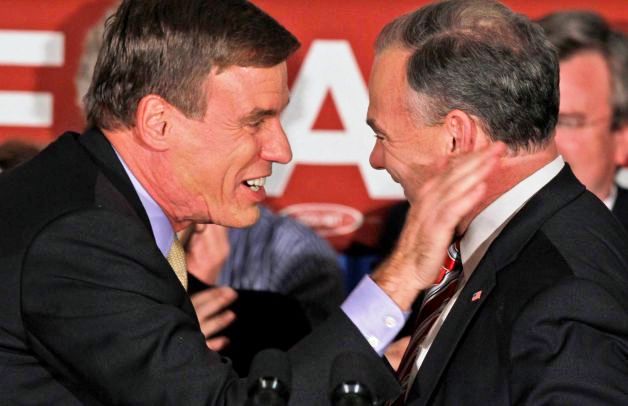
In the wake of a second Barack Obama victory and Democrat Tim Kaine‘s defeat of George Allen for U.S. Senate, are Republicans losing their grip on Virginia?
With popular Democratic Sen.Mark Warner floating the idea of returning to the governor’s office, Virginia Democrats may be on the ascendancy.
Since 1977, the party that has won the presidency has lost the state’s gubernatorial election the following year. But changing demographics could break the “Virginia Effect” in 2013 and give Democrats an edge.
If Virginians halt the cycle and vote in a Democratic chief executive, does that mean the Old Dominion is doubling down on Obamanomics? Should employers be worried? Should taxpayers be reaching for their wallets?
Business groups, political analysts and free-market think tanks say not necessarily.
“For most part, Virginia’s governors — Republican and Democrat — have been pro-business,” Virginia Chamber President and CEO Barry DuVal said recently.
Clayton Roberts, head of the Virginia Free Enterprise Foundation, agrees.
“If history is any guide, Virginia will be in good hands either way,” said Roberts, who describes his organization as “pro-business, pro-free enterprise and stubbornly nonpartisan.”
Unlike their counterparts in Washington, D.C., Democrats in Richmond tend to favor economic pragmatism over political dogmatism.
If anything, Roberts says Virginia’s Democratic governors have exercised more fiscal restraint.
“Since Doug Wilder, Jim Gilmore, George Allen and Tim Kaine, it’s been the Republican administrations where the budgets have grown the most,” Roberts said.
“George Allen spent like crazy. Gilmore too. Mark Warner fixed holes in the state budget by cutting it. Wilder, Kaine and Warner held the line and managed the purse-strings very wisely,” Roberts said.
Timing accounts for some of this behavior. Democrats happened to be in office during some of the state’s toughest economic times and had little opportunity to spend.
Nor did they automatically resort to tax increases or “revenue enhancements” to balance the budget.
“Kaine tried to raise taxes in his final year, but the Legislature blocked that. Wilder never tried to raise taxes,” Roberts said.
Joe Henchman, vice president of state projects at the Washington, D.C.-based Tax Foundation, said that Gov. Bob McDonnell, a Republican, has expanded the use of fees to generate revenue. Henchman said the Foundation takes a dim view of fees, which can help to create “slush funds.”
The Chamber is taking proactive steps this fall to ensure that tax-and-spend policies don’t trickle down from Washington next year.
“We will be looking at where each nominee stands on big issues that impact our competitiveness as a state,” DuVal said.
In concert with other business groups, the Chamber is developing “Blueprint Virginia,” a long-term priority list that includes transportation infrastructure, tort reform, energy development and “education and workforce training that get results,” DuVal said.
The venture will be launched Nov. 29 at an economic summit in Williamsburg.
“The goal is to have an agenda to present to the new governor by December 2013,” DuVal said.
Among the speakers the summit will be former Mississippi Gov. Haley Barbour and Warner. That may be no coincidence.
Warner said this week he will make his gubernatorial decision by Thanksgiving — one week before the summit.
McDonnell is prohibited by state law from serving two consecutive terms.
While a run for governor might seem like a step backward for Warner, it could be a good move politically. Warner wouldn’t have to quit his Senate seat, since his term doesn’t expire until 2014, and if he wins, he would name his successor. And he could put himself in better position to run for president.
HE MEANS BUSINESS: From Mississippi to Virginia, Terry McAuliffe straddles the political and business worlds.
Barbour, meantime, has developed close ties with Terry McAuliffe, the former Democratic National Committee chairman who has been ramping up a run for governor.
Chairman of the Mississippi-based electric car company,Green Tech Automotive, McAuliffe brings strong business credentials to the race, says Roberts.
“He’s building cars in Mississippi because he got a better deal from Haley Barbour than Bob McDonnell,” Roberts added.
McAuliffe was not available for comment.
On the Republican side, gubernatorial aspirants Lt. Gov. Bill Bolling and Attorney General Ken Cuccinelli are squaring off for a convention fight next spring.
Geoffrey Skelley, a political analyst at the University of Virginia, predicts that a Democratic primary could be lopsided.
“Obviously, if Warner runs, he’d be an overwhelming favorite, whereas Terry McAuliffe would be in a dogfight at the very least,” Skelley said.
Mike Thompson, of the Thomas Jefferson Institute for Public Policy, suggests that Warner — if he runs— would have strong cross-party appeal.
“Tim Kaine is more liberal than Warner, and he just won. Warner is not tied to Obama the way that Kaine is,” Thompson said.
On the other hand, Roberts can envision a scenario where “Cuccinelli could win in a landslide.”
If one thing is clear, it’s that the Old Dominion has transformed into what Roberts calls the “New Dominion.”
“The demographics are changing quickly,” he said, pointing to the ongoing influx of liberal-minded voters in Northern Virginia and a rising number of minorities stretching down to Hampton Roads — all of which fueled Democratic victories this year.
But the free marketeer is taking it in stride.
“There have been nine governors in my (adult) lifetime, and there’s never been a bad one,” Roberts said.
Contact Kenric Ward at [email protected]


